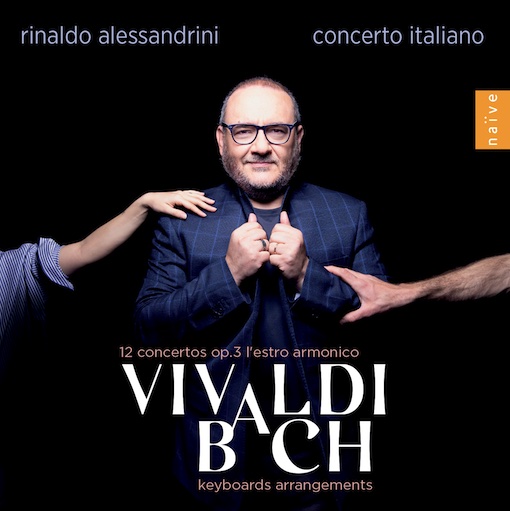VIVALDI L’estro armonico JS BACH Keyboard arrangements
View record and artist detailsRecord and Artist Details
Composer or Director: Rinaldo Alessandrini
Genre:
Orchestral
Label: Naïve
Magazine Review Date: 04/2022
Media Format: CD or Download
Media Runtime: 158
Mastering:
DDD
Catalogue Number: OP7367

Tracks:
| Composition | Artist Credit |
|---|---|
| (6) Concertos, Movement: No. 2 in A minor, BWV593 (after Vivaldi, Op. 3/8) |
Johann Sebastian Bach, Composer
(L')Estro Armonico Lorenzo Ghielmi, Organ |
| (6) Concertos, Movement: No. 5 in D minor, BWV596 (after Vivaldi, Op. 3/11) |
Johann Sebastian Bach, Composer
(L')Estro Armonico Lorenzo Ghielmi, Organ |
| (16) Concertos, Movement: D, BWV972 (Vivaldi: Concerto, Op. 3/9 RV230) |
Johann Sebastian Bach, Composer
(L')Estro Armonico Rinaldo Alessandrini, Composer |
| (16) Concertos, Movement: C, BWV976 (Vivaldi: Concerto, Op. 3/12 RV265) |
Johann Sebastian Bach, Composer
(L')Estro Armonico Rinaldo Alessandrini, Composer |
| (16) Concertos, Movement: F, BWV978 (Vivaldi: Concerto, Op. 3/3 RV310) |
Johann Sebastian Bach, Composer
(L')Estro Armonico Rinaldo Alessandrini, Composer |
| Concerto for 4 Harpsichords and Strings |
Johann Sebastian Bach, Composer
(L')Estro Armonico Andrea Buccarella, Harpsichord Ignazio Schifani, Harpsichord |
| (12) Concerti grossi, '(L')estro armonico' |
Antonio Vivaldi, Composer
(L')Estro Armonico Rinaldo Alessandrini, Composer |
Author: Charlotte Gardner
We’re so familiar with Vivaldi these days that it’s easy to forget what an impact his first set of concertos, L’estro armonico, made upon its publication in Amsterdam in 1711 – the world’s first full hit of that now instantly recognisable language of fast chord changes, punchy rhythms and sharp dynamic shifts. Then there was its title, marrying harmony with estro – ‘poetic fury’ or ‘impulse of the faculty of imagination’ – in an era when ‘12 Concertos for three violins and continuo’ was generally as sexy as descriptions got. No wonder Bach, with his curiosity in stylistic developments beyond his immediate surroundings and his penchant for stretching his own compositional muscles, quickly saw these works as ripe for keyboard arrangement. What’s more surprising is that there haven’t been more recordings such as this one from Concerto Italiano and Rinaldo Alessandrini, presenting Vivaldi’s set alongside its six Bachian reworkings, each transcription following immediately after its Venetian parent concerto. No matter, since this double-disc offering is so good that it feels like the only set a person would ever need.
The ensemble sound itself from Concerto Italiano is warm, nimble and buoyant, walking a perfect line of being smartly rhythmic and dramatically taut while retaining elegance and flow, with nothing exaggerated. There is such a chamber awareness. Listen, for instance, to the class with which cellist Marco Frezzato smoothly shimmies in and out of the solo action in the opening Allegro of No 10 in B minor for four violins. That concerto also provides plenty of opportunities to savour the togetherness of violinists Boris Begelman, Elisa Citterio, Andrea Rognoni and Stefano Barneschi, whose collective expression in moments such as the central Largo feels alive with hidden Vivaldian word-painting.
Then, what a show for Bach’s ensuing BWV1065 version in A minor for four harpsichords, opening with a switch to darker Germanic colour, followed by the combined luminous virtuosity of the soloists – Alessandrini himself, with Andrea Buccarella, Ignazio Schifani and Salvatore Carchiolo – who sparkle against the ensemble sound. Their trilling is truly pulse-racing. Note, too, that the Vivaldi concertos have been recorded at the high Classical pitch used in Venice and the same pitch has been kept for the Bach – an intelligent ripping-up of the authenticity rulebook so as to avoid the jarring effect you’d otherwise get when hopping over to Kammerton or Chorton.
There are many such violin and ensemble highlights – not least the four violins’ liltingly Frenchified grace in No 7’s concluding minuet – but of course the other joy here is that BWV1065 is the only Bach transcription employing an orchestra. The others are for solo harpsichord or organ, providing further kaleidoscopic colour to proceedings. So we have Alessandrini as solo harpsichordist for BWV978, 976 and 972, serving up contrast-rich readings that are by turns daintily exuberant and poetically expressive; the tender Largo of BWV976 in C is especially touching. The further pleasure of Lorenzo Ghielmi on the Mascioni organ of Santa Maria dei Miracoli in Morbio Inferiore, Switzerland, brings an additional panoply of colour, favourite moments including his combination of nimbleness and majesty in the opening Allegro of BWV593. I can’t remember when I last enjoyed a Vivaldi album as much as this.
Discover the world's largest classical music catalogue with Presto Music.

Gramophone Digital Club
- Digital Edition
- Digital Archive
- Reviews Database
- Full website access
From £8.75 / month
Subscribe
Gramophone Full Club
- Print Edition
- Digital Edition
- Digital Archive
- Reviews Database
- Full website access
From £11.00 / month
Subscribe
If you are a library, university or other organisation that would be interested in an institutional subscription to Gramophone please click here for further information.




